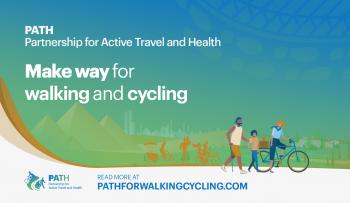
Cycle for mental health – World Mental Health Day 2023
Today marks World Mental Health Day 2023, and the theme for this year ‘Mental health is a universal human right’. The message is as timeless and simple as the remedy itself - cycling.
Today, with one in eight people in the world living with a mental health disorder, the significance of mental health cannot be overstated. World Mental Health Day 2023 marks an important campaign to raise awareness towards promoting and protecting mental health. This year’s theme, ‘Mental health is a universal human right’, highlights the widespread prevalence of mental health issues as they rise at an alarming rate. However, more and more, cycling is being prescribed as a remedy to meet this global crisis.
The connection between cycling and improved mental health
At the European Cyclists’ Federation, we firmly believe that cycling is an effective means to improve overall well-being and mental health. This belief is supported by the National Institutes of Health stating that, “Some studies have demonstrated a decrease in depression symptoms, while others have demonstrated an overall increase in emotional well-being and happiness.”
Cycling is an affordable, inclusive and accessible form of physical activity which delivers a myriad of benefits for people of all ages, socio-economic backgrounds, abilities, and incomes. Our 2018 report, titled ‘The Benefits of Cycling’, revealed that physical activity, such as cycling, is also linked to 17% lower odds for developing depression.
World Mental Health Day is now over 30 years old and the campaign around the day remains a crucial effort in supporting wider understanding of mental health. Mental health is defined by WHO as, “A state of mental well-being that enables people to cope with the stresses of life, to realize their abilities, to learn well and work well, and to contribute to theircommunities.”
The scale of mental health issues in Europe
Mental health problems are estimated to affect approximately 84 million people across the EU alone. The European Commission reports a staggering total cost of mental health problems: a €600 billion impact across the 27 EU member states and the United Kingdom. Recognising the scale and severity of the crisis, the Commission has introduced a proposal calling for a more comprehensive approach to mental health. Stating the necessity of shifting prioritisation to “prevention-oriented and multi-stakeholder approach to mental health”.
Cycling is a natural ‘antidote’.
Cycling produces benefits far beyond providing physical exercise. It can be seen as an ‘antidote’ to a range of mental health issues. Research by ECF has shown cycling prevents 18, 110 premature deaths per year in the EU. This corresponds to an economic value of €52 billion per year, reducing the burden on healthcare and social security systems, while ensuring more Europeans live healthier and happier lives.

The physical activity of cycling allows more blood to be pumped around the body faster, facilitating ‘happy’ hormones such as dopamine, endorphins and serotonin to be received in the brain. Ultimately this mechanism contributes to improved mental health and well-being.
However, the benefits of cycling don’t stop at improving overall health. Community led cycling programmes support connection building among individuals, strengthening a sense of solidarity and community. All this helps improve cognitive function, reducing depression, anxiety and stress. We believe cycling facilitates open dialogue about mental health and subsequently destigmatises mental health issues.
World mental health day holds an essential message, ‘Mental health is a universal human right’. This message is as simple and timeless as cycling itself. The journey to improving mental health begins with the first step. Find the support and information you need for your journey towards a healthier body and mind below:
World Health Organization (WHO) Mental Health
Contact the author
Recent news!
Contact Us
Avenue des Arts, 7-8
Postal address: Rue de la Charité, 22
1210 Brussels, Belgium









